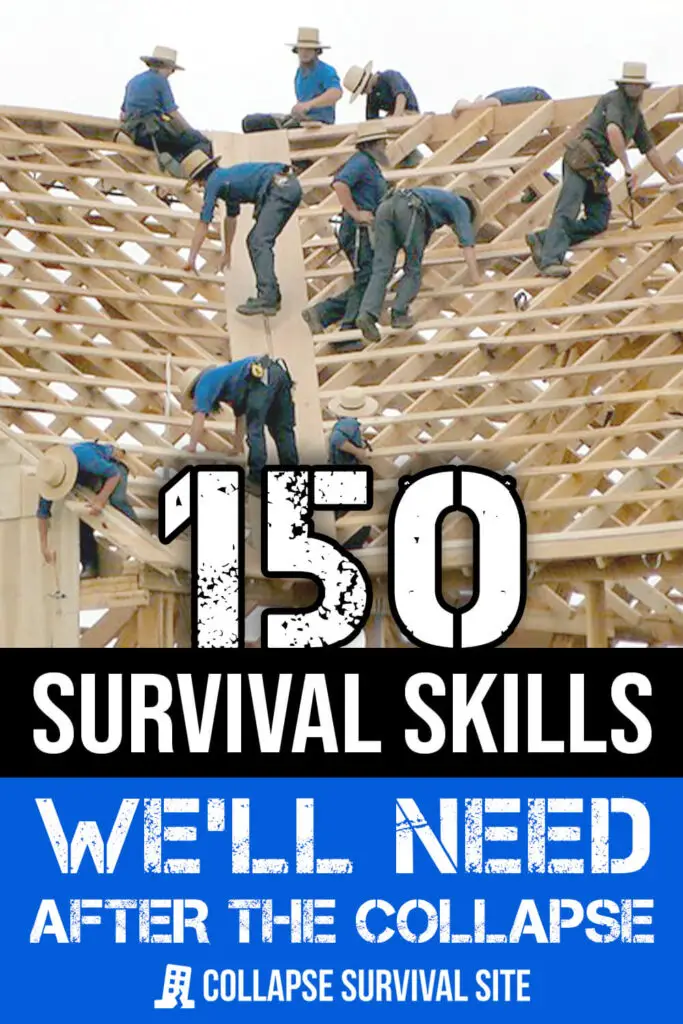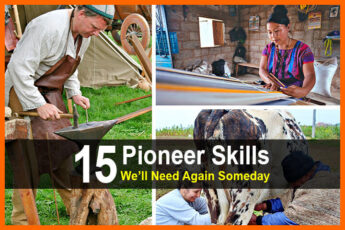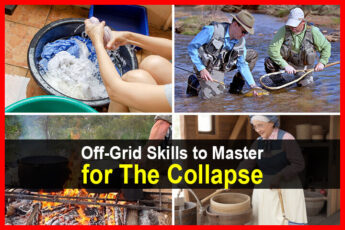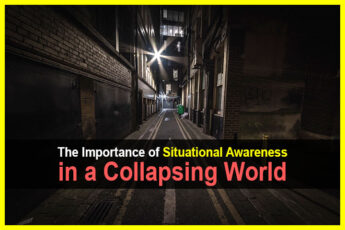Estimated reading time: 7 minutes
When a society collapses, access to basic comforts and resources collapse with it. Stores aren’t open and even when they are, the shelves are bare and prices are out of control. There’s a long history of societal collapse due to wars, plagues, and catastrophic natural disasters.
Most of the population finds themselves in desperate straits, struggling to satisfy the most basic needs. Those who survive typically have the skills and experience to improvise solutions. Here’s a list of many of those skills. Each offers a link to a book or article expanding on the subject.
Want to save this post for later? Click Here to Pin It On Pinterest!
- Basic Home Repair Skills
- Plumbing Repairs
- Electrical Repairs
- Home Structural Repairs
- Pioneer Construction and Domestic Skills
- Auto and Engine Repair
- Electricity Generation
- Gardening
- Livestock
- Into The Wild
- Food Preservation
- Water
- Pioneer Cooking
- Refrigeration
- Lighting
- Clothing
- Heating and Air-Conditioning
- First Aid
- Sanitation
- Defense
- Communication
- Orientation
- Knowledge Banks
Basic Home Repair Skills
It may be difficult if not impossible to find, let alone hire, someone to do many of the home repairs we often encounter. Having the tools and skills to keep things working around the house is a skill that everyone will eventually need.
Plumbing Repairs
Electrical Repairs
Home Structural Repairs
- Home repairs 101
- Basic construction and home repairs
- Roofs
- Walls
- Windows and doors
- Flooring
- Guide to construction tools
Pioneer Construction and Domestic Skills
Our pioneer ancestors honed the skills to build everything they needed. Their tools were basic and hand or foot powered. More importantly, they knew how to use the tools and materials to build just about anything from log cabins to the brooms that kept them clean.
- Choosing pioneer tools
- Using pioneer tools
- Log cabin construction
- Timber frame construction
- Choosing the right tools
- Emergency shelters
- Log splitting
- Rail splitting
- Woodworking
- Timber cutting
- Blacksmithing
- Pioneer survival skills
- Rustic furniture making
- Off-grid lighting solutions
- Knot tying
- Building a fence
- Welding
- Carpentry 101
- Rope and net making
- How to make charcoal
- Restoring vintage pioneer tools
- Basket making
- Pottery
- Broom making
Auto and Engine Repair
Being able to do basic repairs on your vehicle may become very important as supplies and services become limited. Just as important is the ability to do small engine repairs for chainsaws and other gas powered tools.
Electricity Generation
At a time when electric power may become undependable or simply unavailable it helps to know how to generate your own power.
Gardening
Gardening and the ability to do all of the things associated with it is a critical skill for anyone anywhere. Even people who live in apartments without a yard can raise their own vegetables through hydroponics or bucket gardening.
- Garden planning
- Harvesting seeds
- Starting seeds indoors
- The milk jug greenhouse
- Propagating plants
- Growing, pruning and grafting trees
- Building a greenhouse
- Permaculture
- Composting
- Vermiculture
- Farm and garden tools
- Hydroponics
- Bucket gardening
Livestock
If you have some land, you can consider livestock. But even on a small plot of land you can raise chickens, rabbits, and even a few pigs. There are many skills associated with animal husbandry from the care and feeding of the animals to butchering, tanning, and shearing.
- Animal husbandry
- Building barns, sheds and outbuildings
- Breeding and birthing livestock
- Raising chickens
- Raising rabbits
- Growing your own animal feed
- Butchering livestock
- Sheering sheep and processing wool
- Veterinary skills
- Tanning hides
- Beekeeping
Into The Wild
Even if you live in the city you can wild forage edible plants. And if need be, you can hunt, fish, and even trap wild game. Wilderness areas offer the most opportunities but don’t assume that the city and suburbs aren’t without foraging and at least fishing potential.
Food Preservation
For thousands of years we’ve developed, refined and improvised solutions for preserving food. This is another fundamental skill that will continue to be critical at a time when electricity and refrigeration are unreliable.
- Canning fruits and vegetables
- Pressure canning meats and seafood
- Root cellaring
- Dehydrating
- Drying
- Fermentation
- Smoking
Water
It’s projected that by the year 2035, 1.8 billion people around the world won’t have access to drinkable water. Knowing how to collect, filter, purify, and store water may be one of the most critical skills to master and should be at the top of your skills list.
- Water collection from natural sources
- Collecting rainwater
- Water filtering and purification
- Water storage
Pioneer Cooking
Knowing how to cook without electricity may seem easy for the weekend barbecue chef, but if you have to do all of your cooking without power all of the time, you might want to look at some of the ways the pioneers made the best of things when an open fire was their only source of heat.
- Pioneer cooking equipment
- Pioneer cooking skills
- Woodstove cooking
- Cooking with cast iron
- Maintaining cast iron
- Starting a fire without matches
- Scratch cooking
- Rendering lard
- Milling grains
- Baking
- How to make apple cider vinegar
- Tapping maple trees for maple syrup
- How to make cheese
- Home brewing
- Distilling
- Stocking a pantry, keeping an inventory and meal planning
Refrigeration
There are ways to keep foods cold without power, from root cellars to some improvised solutions like a cold box or even a metal box in a cold spring creek.
Lighting
It’s back to the kerosene lamps, but what happens when the kerosene runs out? Here are some ideas for how to make lighting sources for use both inside and outside when the lights are out.
- Candle making
- Alternative traditional lighting (Crisco and bacon fat candles)
- Solar lighting
- Torches
Clothing
When you can’t buy it new or at a time when no one can find clothes in their size or at a price they can afford, it’s time to literally take things into your own hands.
- Sewing, knitting and weaving
- Spinning wool
- Mending and basic clothing repair
- Washing clothes by hand
- Leather crafting
- Cobbling
Heating and Air-Conditioning
If you live in an area with weather extremes, your immediate challenge will be heat in winter and for those living in southern latitudes – some way to keep cool in summer. There are some good pioneer solutions and even some ancient technologies and ideas that were surprisingly effective and in some ways ingenious.
- Woodstove 101
- Off-grid heating solutions
- Solar water heating solutions
- Emergency heaters
- The passive solar house
- Ancient solutions to staying cool
First Aid
When hospitals are overrun, doctors and dentists are unavailable, and calls to 911 go unanswered, it’s wise to the have the supplies, equipment, and knowledge to take care of medical emergencies affecting you and your family.
- Basic first aid
- Minor surgery
- The Merck Manual Home Edition
- The OTC medicine chest
- Making medicinal herbal tinctures
- Dental first aid
- Natural cures
- Pet first aid
Sanitation
If you have a bucket of water, you can still flush a toilet even if the water taps are dry. But there’s more to sanitation than flushing a toilet. Here are some basic ideas to keep things clean.
- Outhouse 101
- Soap making
- Making beauty and skincare products
- Making cleaning supplies
- Natural dental hygiene
- How to make toilet paper
Defense
It’s quite likely that law and order will be overwhelmed at a time of societal collapse. Home security and self-defense are common sense solutions you should understand and be prepared to implement. Here are some of the basic considerations:
- Home security
- Off-grid perimeter alarms
- Self-defense
- Non-lethal weapons
- Firearms 101
- Gunsmithing
- Reloading ammunition
Communication
The Internet may still work, and the same is true for cell phones. Then again, service may be intermittent or simply unavailable in some areas. Here are some basic ideas for how to not only stay in touch with family and friends but stay informed as events unfold.
Orientation
We’ve become spoiled by GPS and any number of things could compromise the ability of GPS systems to continue to function. It’s time to relearn those map reading skills and learn a few others things about how to figure things out without electronics.
Knowledge Banks
There are a number of articles that offer links to books that cover many of the skills we’ve mentioned and some obscure ones you may actually need to know. Here are the links to those articles, and the lists will take you to the specific books and titles for each subject.
- Assembling a survival library
- Free survival books
- Urban survival books
- Top 10 books on survival
- Survival supplies
Did We Miss Anything?
Probably. If you think of a skill that should be on this list, please add a comment below. Even if a collapse never occurs or is not as severe as some fear, these skills are invaluable.
Like this post? Don't Forget to Pin It On Pinterest!









